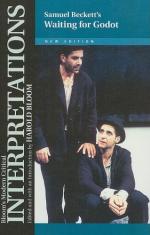|
This section contains 11,410 words (approx. 39 pages at 300 words per page) |

|
SOURCE: Tassi, Marguerite. “Shakespeare and Beckett Revisited: A Phenomenology of Theater.” Comparative Drama 31, no. 2 (summer 1997): 248-76.
In the following essay, Tassi suggests options for staging Shakespearian plays in light of Beckett's absurdist theater.
Comparisons of William Shakespeare and Samuel Beckett have been popular among academic critics over the past few decades. In the locus classicus of such comparisons, Shakespeare Our Contemporary, Polish critic Jan Kott memorably argued that Shakespeare's King Lear bore a deep thematic resemblance to Beckett's dark absurdist dramas.1 Beckett's universe of the grotesque, of incomprehensible punishment and painful endurance, offered Kott the vision he needed to reinvent Shakespeare for Eastern European audiences who had undergone the atrocities of world war, concentration camps, fascism, and widespread oppression. Kott's Shakespeare, like Beckett, unflinchingly exposed the “absurd mechanism” at work in the universe and penetrated to “the thing itself,” as Lear called man stripped to the bareness of...
|
This section contains 11,410 words (approx. 39 pages at 300 words per page) |

|


